Choosing between Bricks and Elementor for your WordPress website can feel overwhelming, especially when both promise to simplify your web design process.
As two of the most popular page builders available today, each brings unique strengths to the table. I’ll break down everything you need to know about these tools to help you make an informed decision.
This comparison will examine pricing, ease of use, performance, design flexibility, and other key factors. By the end, you’ll have a clear understanding of which page builder aligns with your specific needs and budget.
Bricks vs Elementor: Key Difference
Now let’s examine the fundamental differences between these two page builders across critical parameters that matter most to website owners.
| Feature | Bricks Builder | Elementor Pro |
|---|---|---|
| Type | WordPress Theme + Builder | WordPress Plugin |
| Starting Price | $79 (Starter) | $60/year (Essential) |
| Free Version | Trial version available | Yes |
| Lifetime Option | Yes ($599 unlimited sites) | No |
| Elements/Widgets | 57 + 21 WooCommerce | 100+ (with extensive add-ons) |
| Performance | Cleaner code, faster loading | Can be resource-intensive |
| Learning Curve | Moderate (developer-friendly) | Easy (beginner-friendly) |
| Template Library | Limited but growing | Extensive (3000+ templates) |
| Third-party Add-ons | Few available | Massive ecosystem |
| Custom CSS | Advanced built-in support | Basic to advanced |
| Responsive Design | Excellent control | Good control |
| WooCommerce Integration | Built-in elements | Extensive features |
| Community Support | Growing community | Large, established community |
This comparison reveals that each builder serves different user needs and preferences, with distinct advantages depending on your requirements.
What Is Bricks?
Bricks is a WordPress theme with a built-in page builder that focuses on clean code and performance optimization. Unlike traditional page builders that work as plugins, Bricks replaces your entire theme, offering a more integrated approach to website creation.
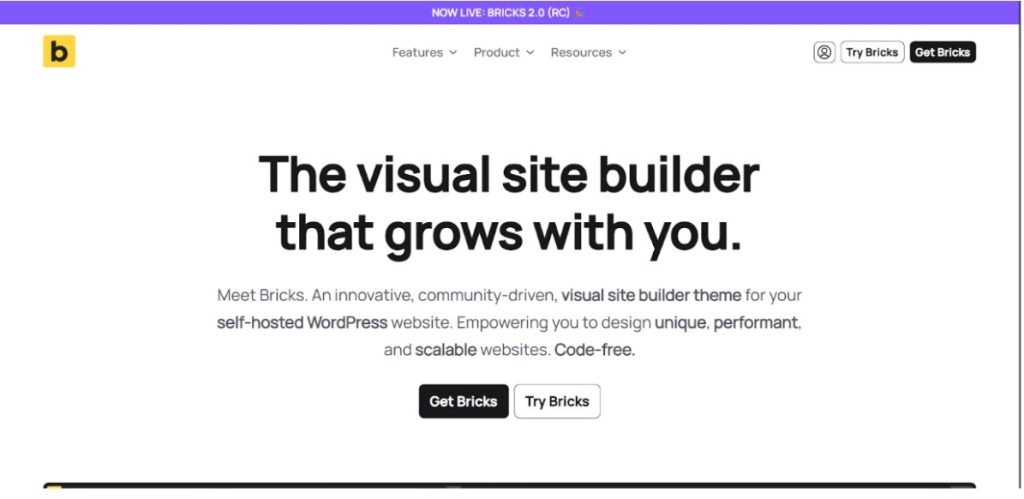
It features live front-end editing, dynamic data capabilities, and advanced customization options that appeal to both designers and developers.
What Is Elementor
Elementor is a WordPress plugin that transforms any theme into a visual page builder. With over 10 million active users, it’s one of the most widely adopted page builders in the WordPress ecosystem.
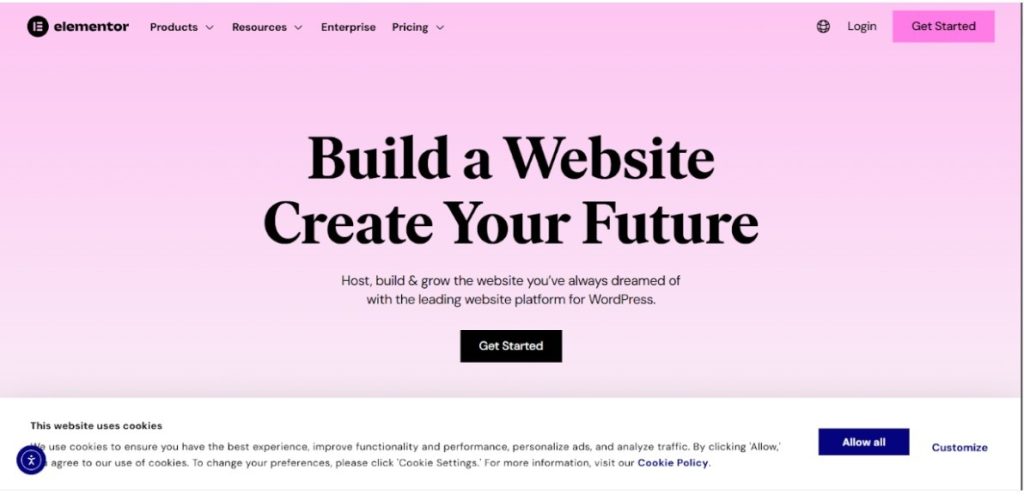
Elementor offers drag-and-drop functionality, extensive template libraries, and works seamlessly with most WordPress themes without requiring you to switch your existing setup.
Bricks vs Elementor: Which One Is Easier To Use?
Let me walk you through the user experience differences between these two page builders to help you understand which might work better for your workflow.
Bricks User Experience
Bricks offers a powerful but complex interface that can feel overwhelming initially. The three-column editor provides extensive customization options for every element, including conditional logic and advanced interactions.
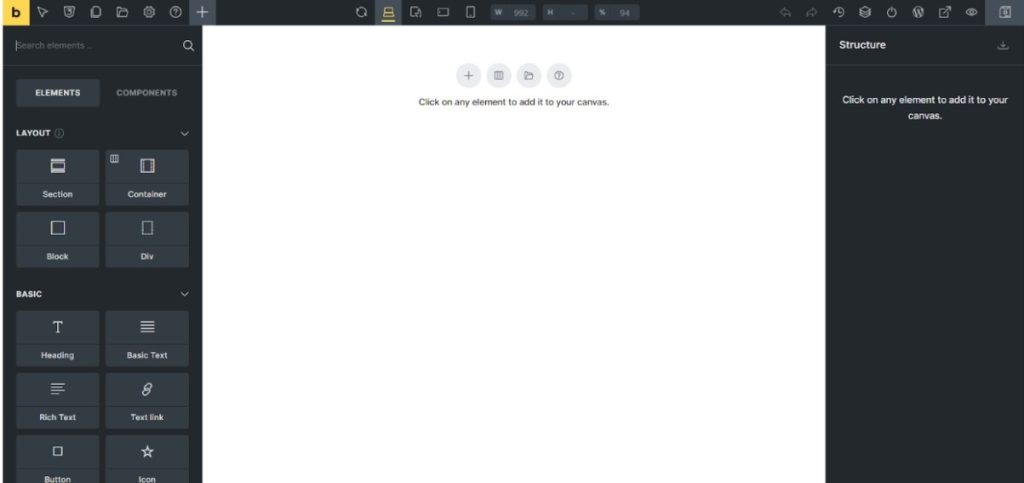
While feature-rich, the interface doesn’t collapse horizontally, leaving you with a smaller canvas. This depth of control makes it ideal for users who want granular control over their designs.
Elementor User Experience
Elementor excels in user-friendliness with its clean, intuitive interface that’s perfect for beginners. The drag-and-drop editor is straightforward, with well-organized menus and a vast template library.
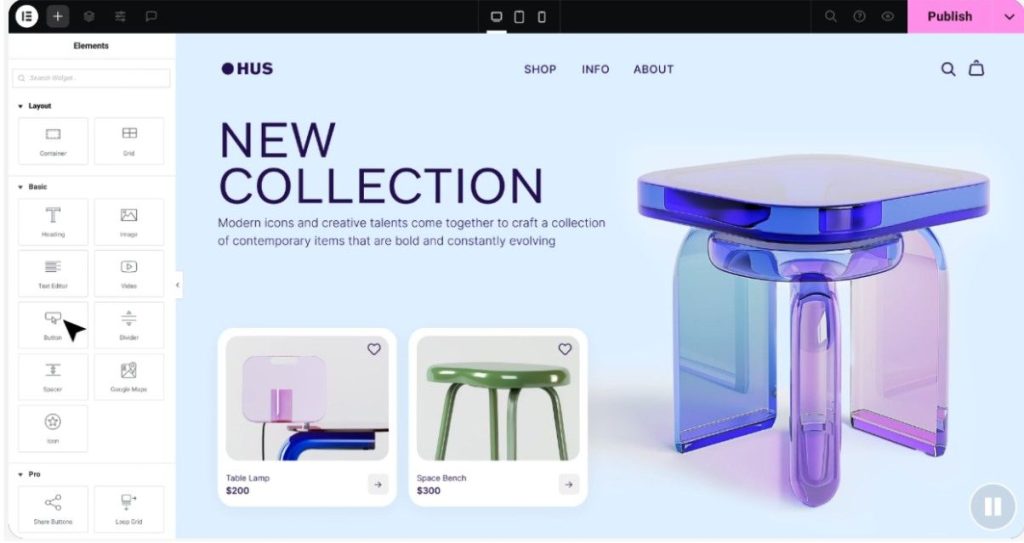
You can quickly add elements, customize layouts, and see changes in real-time without feeling overwhelmed by too many options. The learning curve is minimal, making it accessible to users of all skill levels.
Bricks vs Elementor: Pricing
Understanding the pricing structure is crucial for making informed long-term decisions that fit your budget and project requirements.
Bricks Pricing
Every plan provides a detailed website building solution, featuring over 110 design elements, an advanced Query Loop Builder for dynamic content, an intuitive Menu Builder, a versatile Popup Builder, and a WooCommerce Builder for online stores.
| Plan | Price | What does it include? |
|---|---|---|
| Starter | $79/year | 1 website |
| Business | $149/year | 3 Websites |
| Agency | $249/year | Unlimited Websites |
| Ultimate | $599 One time | Unlimited Websites for a lifetime |
Enhanced with bright Conditions & Interactions, plus regular updates, dedicated technical support, and community templates for seamless website creation.
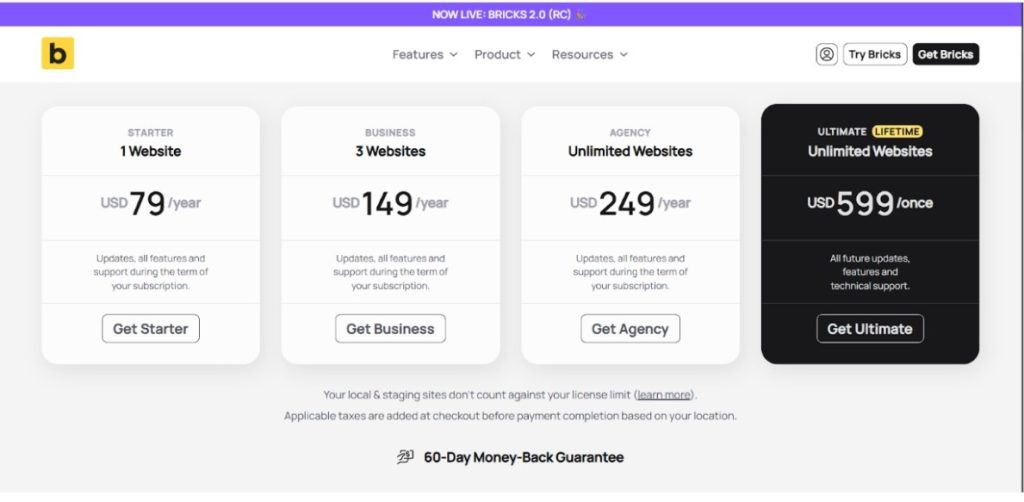
This pricing model focuses on one-time payments rather than recurring subscriptions, making it more cost-effective for long-term projects. The lifetime option provides excellent value for agencies or freelancers managing multiple websites.
Refund Policy of Bricks
Bricks offers a 60-day refund policy, allowing you to get your money back within 60 days if you’re unsatisfied with the product.
Elementor Pricing
Elementor Pro’s Essential Plan starts at $60 per year, with higher tiers offering additional sites and features. While initially cheaper, the subscription model means ongoing annual costs.
| Plan | Price | What does it include? |
|---|---|---|
| Essential | $4.99/Month | 1 Site, Support, 57 Pro Widgets, 10 Cloud Templates |
| Advanced Solo | $6.99/Month | 1 Site, Support, 86 Pro Widgets, 30 Cloud Templates |
| Advanced | $8.25/Month | Up to 3 Sites, Support, 86 Pro Widgets, 30 Cloud Templates |
| Expert | $16.99/Month | Up to 25 Sites, Support, 86 Pro Widgets, 300 Cloud Templates |
Note: All prices are monthly rates when billed annually (Essential: $60/year, Advanced Solo: $84/year, Advanced: $99/year, Expert: $204/year)
Elementor also provides a free version with basic features, allowing you to test the platform before upgrading to premium plans.
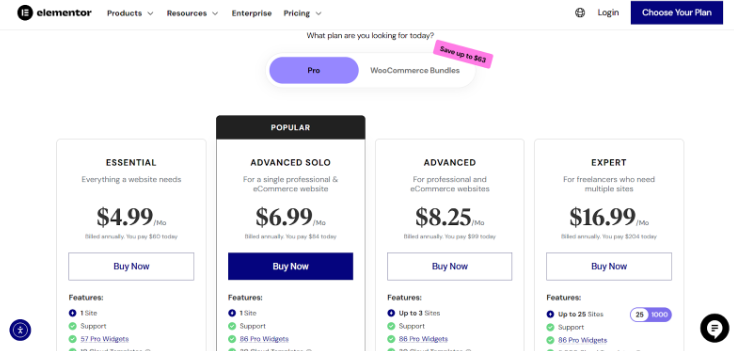
For those seeking more affordable options, there are various Elementor pricing strategies available that can help reduce costs while maintaining access to premium features.
However, if you decide the platform isn’t right for your needs, you can easily cancel your Elementor subscription without hassle.
Refund Policy of Elementor
Elementor provides a standard 30-day money-back guarantee, giving you a month to evaluate whether the platform meets your needs.
From 3 websites upwards, the prices for Bricks are consistently cheaper than for Elementor, which will be particularly relevant for WordPress agencies. If you’re planning long-term use or managing multiple sites, Bricks becomes significantly more cost-effective.
Which Is Better For SEO? Bricks Or Elementor
SEO performance is crucial for your website’s visibility, so let’s examine how each builder affects your search engine optimization efforts.
Bricks For SEO
Bricks generates cleaner code, making it more SEO-friendly by default. The lighter codebase results in faster loading times, a crucial ranking factor.
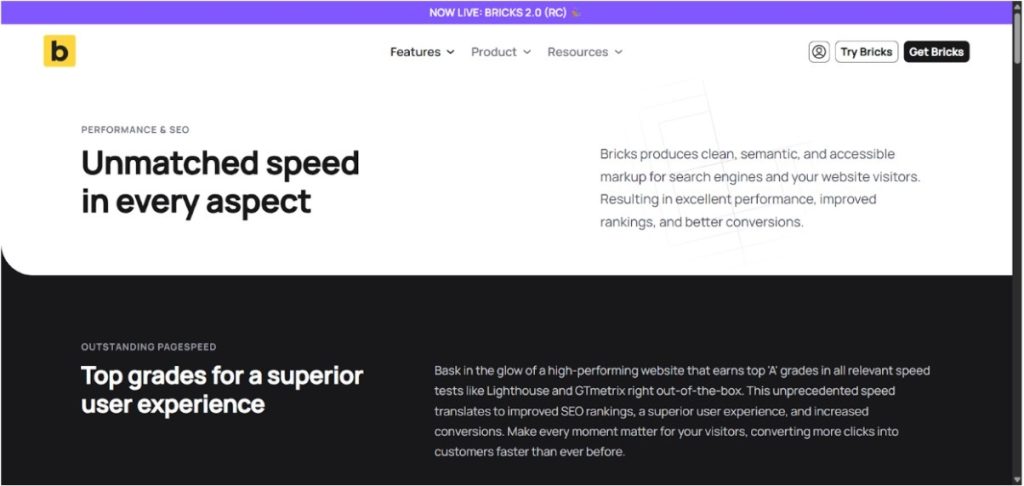
Bricks also offers better control over HTML structure and semantic markup, allowing you to optimize for search engines more effectively while maintaining design flexibility.
Elementor For SEO
While Elementor can impact site speed due to its more resource-intensive nature, it offers built-in SEO features and integrations with popular SEO plugins. The platform has also introduced AI-powered tools that can help optimize content creation, and users can learn how to effectively use Elementor AI to enhance their SEO strategy.
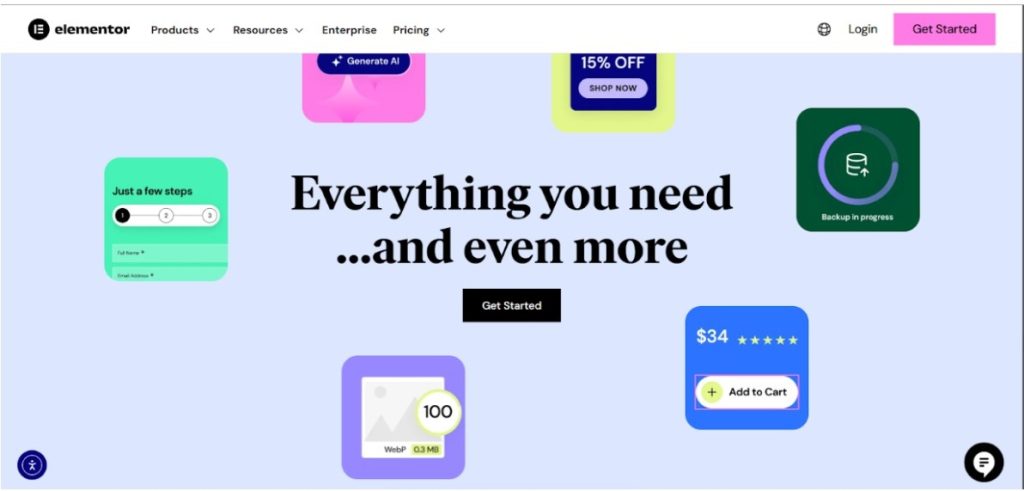
The platform includes schema markup options, heading structure controls, and meta tag management. With proper optimization and caching, Elementor sites can achieve good SEO performance, though they may require more technical tweaking.
Bricks And Elementor: Pros And Cons
Let me break down the advantages and disadvantages of each platform to give you a balanced perspective.
Bricks Pros And Cons
Here’s what you should know about Bricks’ strengths and limitations before making your decision.
| Pros | Cons |
|---|---|
| Clean, lightweight code for better performance | Steeper learning curve |
| Lifetime licensing option available | Smaller template library |
| Advanced customization capabilities | No free version available |
| Built-in dynamic content features | Limited third-party integrations |
| Better for developers and advanced users | Smaller community support |
Now let’s examine what Elementor brings to the table with its own set of advantages and potential drawbacks.
Elementor Pros And Cons
Understanding Elementor’s strengths and weaknesses will help you determine if it matches your website-building needs.
| Pros | Cons |
|---|---|
| User-friendly interface for beginners | Can slow down website performance |
| Extensive template library | Ongoing subscription costs |
| Large community and support resources | May produce bloated code |
| Free version available | Limited customization depth |
| Wide third-party integration ecosystem | Dependency on annual renewals |
For users exploring the platform’s capabilities, understanding the differences between Elementor’s free and pro versions can help determine which features are essential for their projects.
Elementor vs Bricks: Which One Is Best For You?
Choosing the right page builder depends on your specific situation, technical expertise, and long-term goals for your website.
Who is Bricks Best For?
Let me help you determine if Bricks aligns with your specific needs and skill level.
1. For the Beginner/Small Business Owner: Bricks may be challenging initially, but they offer long-term value through their lifetime licensing and performance benefits for growth-focused businesses.
2. For the Freelance Designer/Agency: Perfect choice due to unlimited sites option, client-friendly performance, and professional-grade customization capabilities that justify premium pricing.
3. For the Experienced Developer/Advanced User: Ideal platform offering complete control, clean code output, and advanced features that enable complex, highly customized website development.
Who is Elementor Best For?
Now let’s see if Elementor matches your requirements and experience level.
1. For the Beginner/Small Business Owner: Excellent starting point with its intuitive interface, free version, and extensive learning resources that make website creation accessible.
Special promotions like Elementor’s birthday sales can make the platform even more affordable for budget-conscious users.
2. For the Freelance Designer/Agency: Good option with vast template library and quick turnaround capabilities, though ongoing costs may affect profitability over time.
3. For the Experienced Developer/Advanced User: Suitable for rapid prototyping and client work, but may feel limiting for complex projects requiring deep customization control.
Military personnel and veterans can take advantage of special offers for veterans when considering Elementor Pro.
Tips For Making Your Decision
Here are five practical considerations to help you choose the right page builder for your specific situation.
- Evaluate your technical skill level honestly: choose Bricks if you enjoy learning complex tools, Elementor for simplicity.
- Calculate long-term costs carefully: consider whether lifetime licensing or annual subscriptions fit your budget better.
- Test both platforms thoroughly: use Elementor’s free version and Bricks’ money-back guarantee for hands-on experience.
- Consider your website performance requirements: prioritize Bricks for speed-critical sites, Elementor for feature-rich designs.
- Assess your future growth plans: choose based on whether you’ll manage multiple sites or focus on single projects.
Conclusion: Bricks For Performance, Elementor For Simplicity!
Both Bricks and Elementor serve different audiences effectively, with Bricks excelling in performance and customization while Elementor leads in ease of use and template variety.
Your choice should align with your technical expertise, budget preferences, and long-term website goals.
You prioritize clean code and lifetime value, or prefer extensive templates and beginner-friendly design, both platforms can help you create professional websites that serve your audience well.
Take the next step in building your dream website by choosing the page builder that matches your vision and goals today!
FAQs
Migration is possible but requires manual page recreation. Third-party tools assist with basic content transfer; however, custom styling needs to be rebuilt.
Bricks provides more granular responsive breakpoint control; Elementor offers more intuitive mobile preview and editing tools.
Elementor requires no coding knowledge. Bricks benefits from a basic understanding of HTML/CSS, but it isn’t strictly necessary for usage.
Both integrate with WordPress backup solutions. Elementor updates via plugins; Bricks updates as a theme. Always backup first.
Elementor offers more WooCommerce widgets/templates. Bricks provides better performance but require more manual e-commerce setup work.
